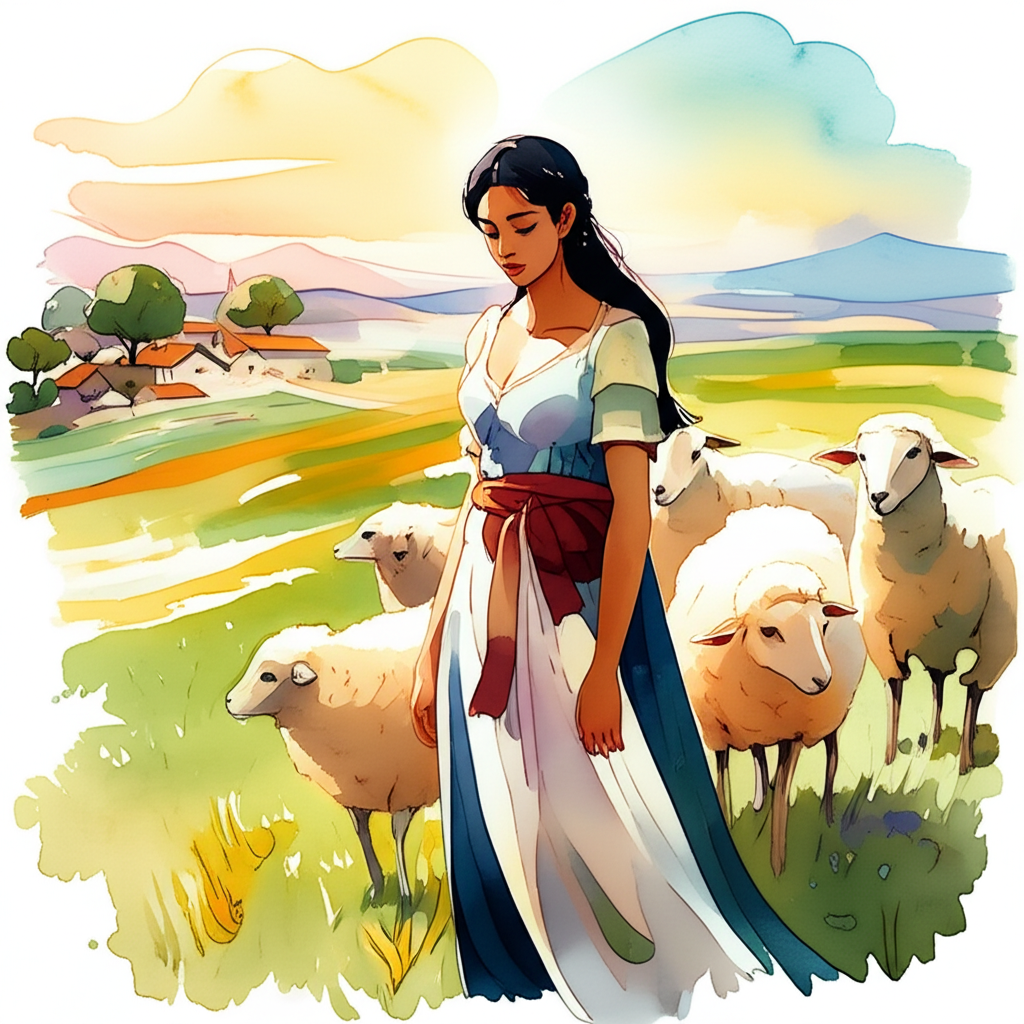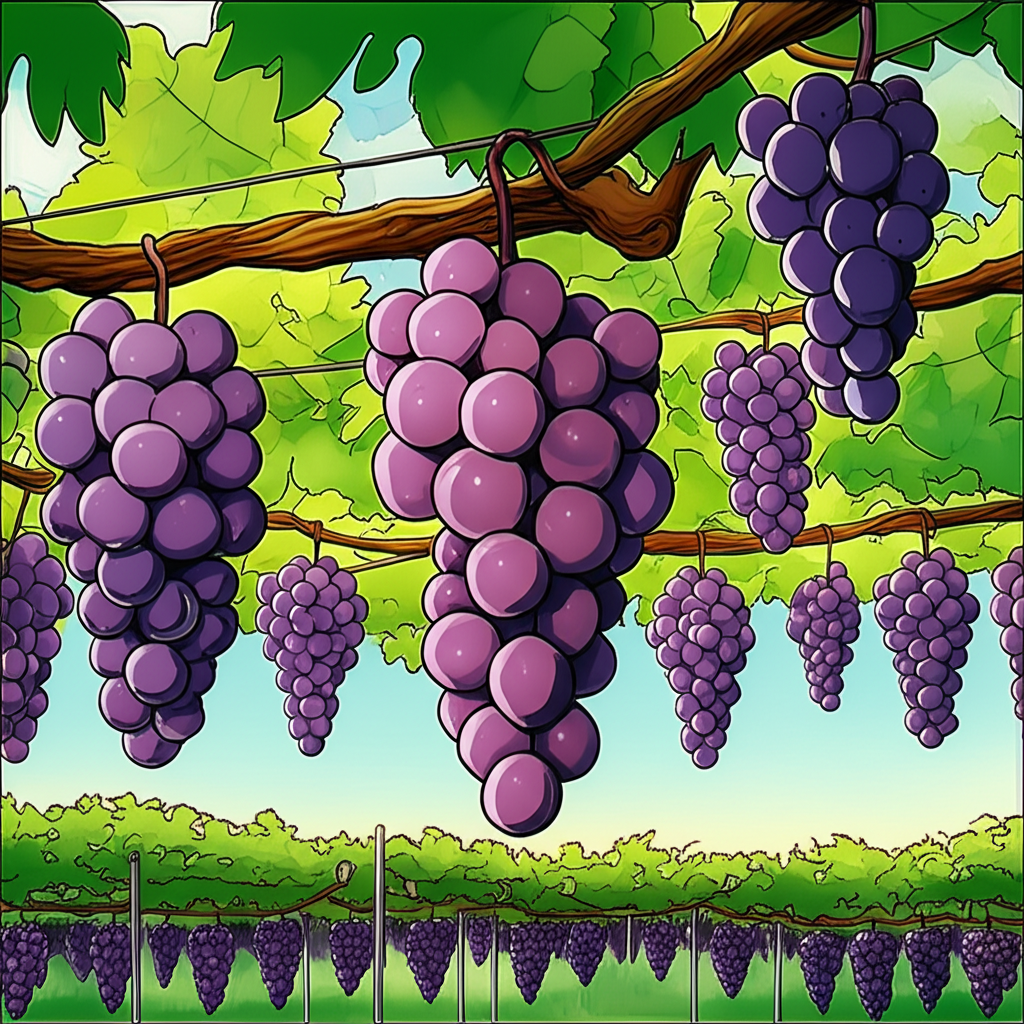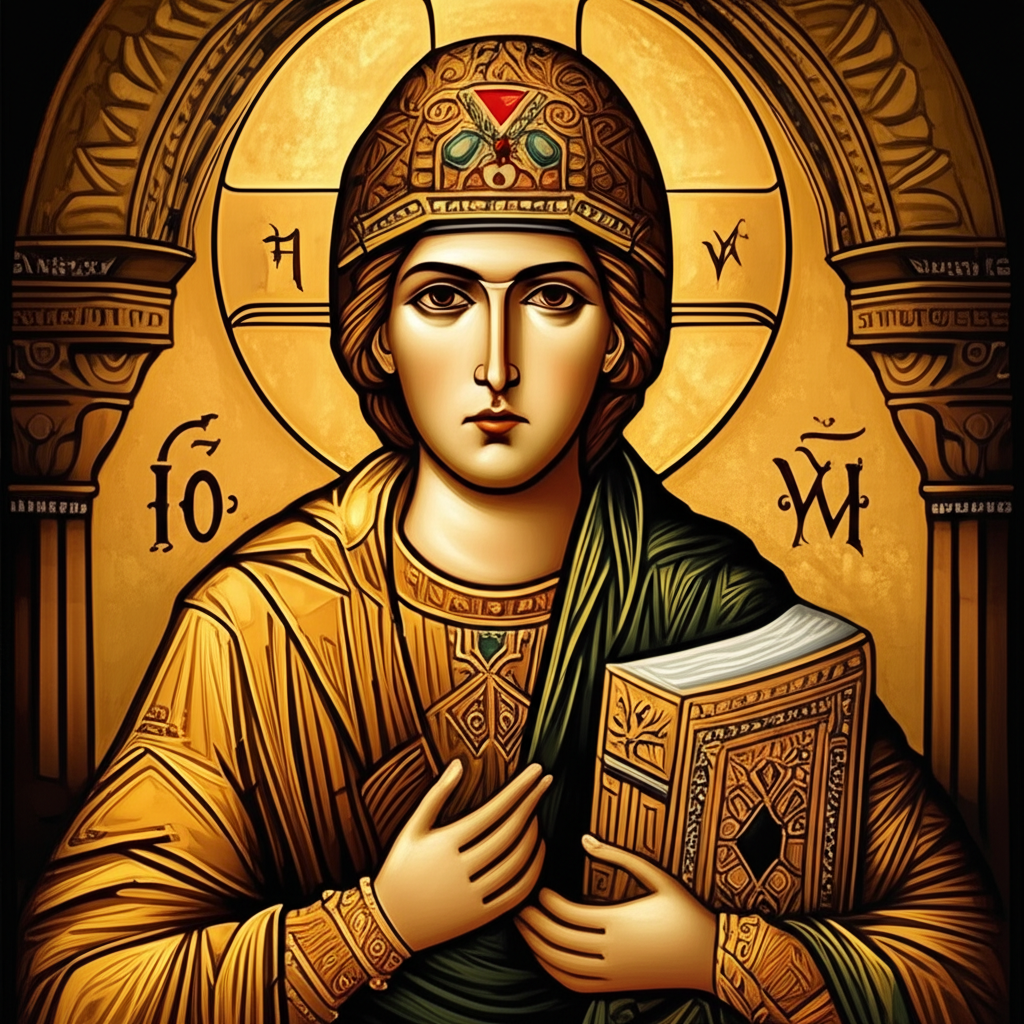Song Of Solomon 1 meaning explained in AI Summary
Chapter 1 of the Song of Solomon introduces the themes of longing, desire, and the beauty of love. The woman expresses her longing for her beloved, comparing him to a shepherd and a gazelle. In response, the man expresses his admiration for the woman, comparing her to a lily and a gazelle. Both parties express their desire for a physical union.
Meaning and Significance
This chapter sets the tone for the entire book, establishing the central themes of love, beauty, and desire. The vivid imagery and poetic language create a passionate and evocative atmosphere.
- Longing and Desire: The intense longing and desire expressed by both the man and woman highlight the powerful nature of human love.
- Beauty and Physical Attraction: The descriptions of physical beauty and the desire for physical union emphasize the importance of the body in human love.
- Spiritual and Emotional Connection: While the physical aspect of love is celebrated, the emotional and spiritual connection between the man and woman is also implied.
- Allegorical Interpretation: Some scholars interpret this chapter allegorically, viewing the man as God and the woman as the Church or the people of God. In this interpretation, the longing and desire expressed in the chapter represent the spiritual longing of God's people for Him.
Application
The Song of Solomon can be applied in various ways:
- Celebration of Love: The book celebrates the beauty and power of human love, reminding us of the importance of love in our lives.
- Spiritual Interpretation: For those who interpret the Song of Solomon allegorically, it can serve as a reminder of God's love for His people and the importance of spiritual intimacy.
- Poetic Appreciation: The Song of Solomon is a beautiful and evocative work of poetry that can be appreciated for its literary qualities and its exploration of human emotions.
In conclusion, Chapter 1 of the Song of Solomon provides a powerful and evocative introduction to the themes and imagery that will be explored throughout the rest of the book. It serves as a reminder of the beauty, power, and enduring nature of love.
Song Of Solomon 1 bible study ai commentary
Song of Solomon chapter 1 introduces the passionate and reciprocal love between the Shulamite woman and her beloved. The chapter unfolds as a poetic dialogue, moving from the bride's intense longing for her lover's presence and affection, through a moment of self-conscious reflection on her appearance, to a place of mutual admiration and communion. It sets the stage for the entire book, establishing the key themes of desire, beauty, pursuit, and the security found in mutual love, which allegorically represents the relationship between God and His people, or Christ and the Church.
Song of Solomon 1 Context
The Song of Solomon, or Song of Songs (Shir ha-Shirim in Hebrew, signifying the greatest of songs), is attributed to Solomon (1 Kings 4:32), renowned for his wisdom and poetic compositions. Written during Israel's monarchy, the book uses the literary form of love poetry, rich with agricultural and pastoral imagery common to the ancient Near East (vineyards, flocks, native flora like cedar and henna). Perfumes and spices like myrrh and spikenard were highly valued luxury goods, used in courtship, cosmetics, and worship, symbolizing preciousness and the potent influence of the beloved's presence. The dialogue form, featuring the bride, the groom, and a chorus ("Daughters of Jerusalem"), was a common literary device. The celebration of monogamous, intimate, physical love served as a divine model for marriage, standing in contrast to the fertility cults and ritual prostitution prevalent in neighboring Canaanite and Mesopotamian cultures.
Song of Solomon 1:1
The Song of Songs, which is Solomon's.
In-depth-analysis
- Word: The Hebrew title is Shir ha-Shirim. This is a grammatical superlative, meaning "The Best Song" or "The Most Excellent Song," immediately establishing its supreme quality.
- The verse serves as a superscription, attributing authorship or dedication to King Solomon, who was known to have composed 1,005 songs (1 Kings 4:32). This attribution anchors the poem in a context of royal wisdom and splendor.
Bible references
- 1 Kgs 4:32: 'He also spoke 3,000 proverbs, and his songs were 1,005.' (Context: Connects the book to Solomon's vast literary and musical work).
- Ps 45:1: 'My heart overflows with a pleasing theme; I address my verses to the king...' (Context: A royal wedding psalm with messianic overtones, sharing the theme of a king and his bride).
Cross references
Eph 5:19 (songs and hymns); Ps 72 (a psalm for Solomon).
Song of Solomon 1:2-4
Let him kiss me with the kisses of his mouth! For your love is better than wine; your name is oil poured out; therefore virgins love you. Draw me after you; let us run. The king has brought me into his chambers. We will exult and rejoice in you; we will extol your love more than wine; rightly do they love you.
In-depth-analysis
- Verse 2: The Shulamite begins in passionate longing. "Kisses of his mouth" signifies the most direct, personal intimacy, not a formal greeting. Her desire is immediate and fervent. "Your love" (dôdîm) refers to lovemaking and expressions of affection, which she declares superior to wine, the ultimate symbol of earthly joy and celebration.
- Verse 3: "Your name is oil poured out" connects the beloved's character and reputation to the spreading aroma of expensive, fragrant oil. His very essence is attractive and precious. This quality makes him irresistible to the "virgins" (Hebrew: alamot), likely her companions (the Daughters of Jerusalem).
- Verse 4: "Draw me...let us run" is a plea for initiation followed by a promise of mutual pursuit. She desires to be brought into "his chambers" (khadar), the most private and intimate space, symbolizing protected union. The perspective shifts from the singular "me" to the plural "we" and "us" (the Daughters of Jerusalem), who celebrate this love. "Rightly do they love you" affirms that his character justifies such adoration.
Bible references
- Phil 3:10: 'that I may know him and the power of his resurrection...' (Context: Apostle Paul's passionate desire for deeper intimacy with Christ).
- Jn 20:17: 'Jesus said to her, "Do not cling to me..."' (Context: Mary Magdalene's fervent desire for proximity to the resurrected Christ, mirroring the bride's longing).
- Ps 63:1: 'O God, you are my God; earnestly I seek you; my soul thirsts for you...' (Context: A deep, soul-level longing for God's presence).
- Eph 5:31-32: '"...the two shall become one flesh.” This mystery is profound, and I am saying that it refers to Christ and the church.' (Context: Establishes human marriage and its intimacy as a picture of Christ's love for the Church).
Cross references
Ps 23:5 (cup overflows); 2 Cor 2:14 (fragrance of knowledge of Him); Jn 12:3 (costly spikenard); Eph 5:2 (fragrant offering); Rev 19:7-9 (marriage of the Lamb); Jn 14:2-3 (I go to prepare a place).
Song of Solomon 1:5-6
I am dark, but lovely, O daughters of Jerusalem, like the tents of Kedar, like the curtains of Solomon. Do not gaze at me because I am dark, because the sun has looked upon me. My mother's sons were angry with me; they made me the keeper of the vineyards, but my own vineyard I have not kept.
In-depth-analysis
- Verse 5: The bride asserts her identity: "dark, but lovely." Her dark skin, from working in the sun, is not a flaw but a feature of her unique beauty. She compares herself to the "tents of Kedar" (dark, weather-beaten goat hair tents of nomads) and the "curtains of Solomon" (magnificent, intricately designed hangings in the palace). She is both rustic and royal, rugged and beautiful.
- Verse 6: She explains her complexion: forced labor in the family vineyards due to her brothers' anger. This may suggest family strife or mistreatment. "My own vineyard I have not kept" is a metaphor. While tending to others' needs, she has neglected her own appearance or personal life.
- Allegorically: The Church/believer recognizes its own state—marred by the toil and sin of the world ("dark")—but remains beautiful and accepted in the eyes of Christ ("lovely") (Eph 5:25-27). This reflects the sinner who, despite their past, is made righteous in Christ.
Bible references
- 1 Cor 1:27-29: 'But God chose what is foolish in the world... what is weak... what is low and despised... so that no human being might boast in his presence.' (Context: God choosing the seemingly unworthy to be His own).
- Eph 5:27: 'so that he might present the church to himself in splendor, without spot or wrinkle... but holy and without blemish.' (Context: Christ's sanctifying work makes His bride lovely, despite her former state).
- Isa 64:6: 'We have all become like one who is unclean, and all our righteous deeds are like a polluted garment.' (Context: Humanity's sinful state, the "dark" aspect the bride feels).
Cross references
Zec 3:3-4 (Joshua's filthy garments replaced); 1 Sam 16:7 (man looks on outward appearance, God on heart); Rom 8:30 (those He called, He also glorified).
Polemics
This passage serves as a direct polemic against superficial standards of beauty. In many ancient (and modern) cultures, fair skin was associated with the leisure of the upper class, while tanned skin signified laborious, lower-class status. The Shulamite boldly declares she is both dark and lovely, subverting this cultural prejudice and asserting that her worth and beauty are not diminished by her hard life.
Song of Solomon 1:7
Tell me, you whom my soul loves, where you pasture your flock, where you make it lie down at noon; for why should I be like one who veils herself among the flocks of your companions?
In-depth-analysis
- Word: "You whom my soul loves" (she'ahavah nafshi) is an expression of profound, all-encompassing love, originating from the core of her being.
- She addresses him as a shepherd and seeks his location "at noon," a time of rest. She wants to be with him in his place of work and repose.
- "Like one who veils herself" (ke'oteyah) is a phrase with some ambiguity. It could mean a woman who wanders aimlessly, is ashamed, or is mistaken for a prostitute (Gen 38:14-15). Her question is born from a desire for a defined, legitimate relationship, not a shameful or uncertain rendezvous among his friends ("companions").
Bible references
- Jn 10:11: 'I am the good shepherd. The good shepherd lays down his life for the sheep.' (Context: Directly identifies Christ as the Good Shepherd, whom the soul of the believer seeks).
- Ps 23:1-2: 'The LORD is my shepherd... He makes me lie down in green pastures. He leads me beside still waters.' (Context: The ultimate psalm of the seeking soul finding rest in the Divine Shepherd).
- Gen 38:14-15: 'She took off her widow's garments and covered herself with a veil... When Judah saw her, he thought she was a prostitute, for she had covered her face.' (Context: Provides a cultural backdrop for why a veiled woman could be misidentified, explaining the Shulamite's concern).
Cross references
Jn 10:27 (my sheep hear my voice); Isa 40:11 (He will tend His flock like a shepherd); Heb 13:20 (the great shepherd of the sheep).
Song of Solomon 1:8
If you do not know, O most beautiful among women, follow in the tracks of the flock, and pasture your young goats beside the shepherds' tents.
In-depth-analysis
- The response, likely from the beloved (or the chorus), begins with an affirmation: "O most beautiful among women." This directly counters any insecurity she expressed in v. 5-6.
- The instruction is practical and clear: "follow in the tracks of the flock." The path to him is not esoteric or hidden; it is found by following where his people have already gone. She is to bring her own "young goats" (her own life and responsibilities) and join the community near him.
- Allegorically: A believer seeking Christ is told to join the fellowship of the saints (the flock), follow the historic path of the church, and live out their faith within that community.
Bible references
- Jn 10:4: 'When he has brought out all his own, he goes before them, and the sheep follow him, for they know his voice.' (Context: The sheep find the shepherd by following his lead and recognizing his voice).
- Jer 6:16: 'Thus says the LORD: "Stand by the roads, and look, and ask for the ancient paths, where the good way is; and walk in it, and find rest for your souls."' (Context: Finding God involves seeking the established, proven ways).
Cross references
Heb 6:12 (imitators of those who through faith inherit promises); Heb 12:1 (run with endurance the race set before us).
Song of Solomon 1:9-11
I compare you, my love, to a mare among Pharaoh's chariots. Your cheeks are lovely with ornaments, your neck with strings of jewels. We will make for you ornaments of gold, studded with silver.
In-depth-analysis
- Verse 9: "A mare among Pharaoh's chariots" is a powerful and prestigious compliment. Egyptian chariots, pulled by elite male stallions, were the most advanced military technology of the day. A beautiful mare unleashed among them would have been captivating, stopping the entire war machine in its tracks. He is saying she is uniquely stunning, valuable, and able to command all attention.
- Verses 10-11: He praises her current beauty ("lovely with ornaments") and then, joined by the "we" (perhaps the artisans of the court or the Trinity in an allegorical reading), promises to enhance it with even greater splendor: "ornaments of gold, studded with silver." His love doesn't just admire; it seeks to adorn and elevate her.
Bible references
- Rev 21:2: 'And I saw the holy city, new Jerusalem, coming down out of heaven from God, prepared as a bride adorned for her husband.' (Context: The ultimate image of God adorning His people with heavenly glory).
- 1 Pet 3:3-4: 'Do not let your adorning be external... but let your adorning be the hidden person of the heart with the imperishable beauty of a gentle and quiet spirit...' (Context: Contrasts physical adornment with the spiritual beauty God values and bestows).
- Eze 16:11-14: 'And I adorned you with ornaments... Thus you were adorned with gold and silver... and your renown went forth among the nations because of your beauty, for it was perfect through the splendor that I had bestowed on you...' (Context: God describing how He took desolate Israel and adorned her, making her beautiful).
Cross references
Isa 61:10 (adorned bride); 2 Chron 9:1-8 (Queen of Sheba and Solomon's splendor).
Song of Solomon 1:12-14
While the king was on his couch, my nard gave forth its fragrance. My beloved is to me a sachet of myrrh, that lies between my breasts. My beloved is to me a cluster of henna blossoms from the vineyards of Engedi.
In-depth-analysis
- Verse 12: Her response to his praise. The king's presence ("on his couch," or at his table) is the catalyst for her own love ("nard" or "spikenard") to emit its fragrance. His nearness brings out the best in her. Spikenard was an extremely precious perfume.
- Verse 13: A "sachet of myrrh" was often worn on a necklace, lying between the breasts. This is a metaphor for how she holds her beloved—close to her heart, a constant, precious, and personal source of comfort and fragrance. Myrrh was also used in purification and burial, hinting at a love that is both purifying and endures through suffering.
- Verse 14: "Henna blossoms" are fragrant white flowers. "Engedi" was a lush, vibrant oasis in the midst of the barren Judean desert. She is saying he is a source of life, beauty, and refreshment in a weary world.
Bible references
- Jn 12:3: 'Mary therefore took a pound of expensive ointment made from pure nard, and anointed the feet of Jesus...' (Context: An act of lavish love and worship, showing the immense value of nard given in devotion).
- 2 Cor 2:15: 'For we are the aroma of Christ to God among those who are being saved and among those who are perishing,' (Context: Believers, in their love for Christ, become a spiritual fragrance to the world).
- Mk 14:3: 'And while he was at Bethany... a woman came with an alabaster flask of ointment of pure nard, very costly, and she broke the flask and poured it over his head.' (Context: Her love is poured out lavishly and sacrificially for her King).
Cross references
Ex 30:23 (myrrh in anointing oil); Matt 2:11 (myrrh as a gift to Jesus); Phil 4:18 (fragrant offering).
Song of Solomon 1:15-17
Behold, you are beautiful, my love; behold, you are beautiful; your eyes are doves. Behold, you are beautiful, my beloved, truly delightful. Our couch is green; the beams of our house are cedar, the rafters are fir.
In-depth-analysis
- Verse 15: Now he speaks, echoing her theme of beauty but directing it back at her. The repetition "Behold, you are beautiful" is for emphasis. "Your eyes are doves" speaks of purity, gentleness, loyalty, and a singular focus (doves were believed to be monogamous).
- Verse 16: She responds in kind, calling him beautiful and "truly delightful." Their love is perfectly reciprocal. She then declares "Our couch is green," moving from personal descriptions to their shared space. Their place of intimacy is nature itself—alive, fruitful, and vibrant.
- Verse 17: The architecture of their love-palace is nature's finest: mighty "cedars" for beams and fragrant "fir" (or cypress) for rafters. This imagery signifies a relationship that is strong, enduring, majestic, permanent, and fragrant.
Bible references
- Matt 3:16: 'and he saw the Spirit of God descending like a dove and coming to rest on him;' (Context: The dove is a symbol of the Holy Spirit, purity, and peace, reflecting the qualities he sees in her eyes).
- Ps 92:12: 'The righteous flourish like the palm tree and grow like a cedar in Lebanon.' (Context: Cedars are a biblical symbol of strength, righteousness, and flourishing).
- Ps 23:2: 'He makes me lie down in green pastures.' (Context: God leads His beloved to a place of rest and life, much like their "green couch").
Cross references
Gen 1:31 (God saw it was very good); Ps 45:11 (King is enthralled by your beauty); Hos 14:8 (I am like a green cypress).
Song of Solomon chapter 1 analysis
- The Movement of Intimacy: The chapter follows a clear progression from personal longing (v.2), to insecurity (v.6), to seeking (v.7), to mutual affirmation (v.9, 15), and finally to shared communion (v.16-17). This arc models the development of a healthy relationship, both human and divine.
- Edenic Imagery: The couple's intimate space is not a physical palace but the natural world (green couch, cedar beams). This hearkens back to the Garden of Eden, portraying their love as pure, unashamed, and blessed by the Creator, existing in harmony with the created world. Their love builds a sanctuary out of nature.
- Allegory without Annulment: While richly allegorical of Christ and the Church (or God and Israel), the literal meaning is never erased. God consecrates physical love within marriage by making it the very metaphor for His own covenant love (Eph 5:32). The passion, desire, and delight are real on a human level and instructive on a spiritual level. The believer's walk with God should be marked by a similar passion, seeking, and responsive praise.
- Dialogue as a Model: The structure is a dialogue, not a monologue. Both the bride and groom initiate conversation, express desire, and offer praise. This reciprocity is central. In the spiritual allegory, this teaches that the relationship with God is not one-sided; He speaks and responds to the seeking heart.
Song of Solomon 1 summary
Chapter 1 introduces the supreme love song between the Shulamite maiden and her beloved King. It begins with her fervent expression of desire for his intimate affection. Despite feeling unworthy due to a life of hard labor, she seeks him out. He responds by affirming her unique beauty, and they engage in a mutual exchange of praise, describing each other with rich metaphors of precious perfumes and natural splendor. The chapter concludes with them united in a love that transforms the natural world into their own majestic and life-giving sanctuary.
Song Of Solomon 1 AI Image Audio and Video











Song Of Solomon chapter 1 kjv
- 1 The song of songs, which is Solomon's.
- 2 Let him kiss me with the kisses of his mouth: for thy love is better than wine.
- 3 Because of the savour of thy good ointments thy name is as ointment poured forth, therefore do the virgins love thee.
- 4 Draw me, we will run after thee: the king hath brought me into his chambers: we will be glad and rejoice in thee, we will remember thy love more than wine: the upright love thee.
- 5 I am black, but comely, O ye daughters of Jerusalem, as the tents of Kedar, as the curtains of Solomon.
- 6 Look not upon me, because I am black, because the sun hath looked upon me: my mother's children were angry with me; they made me the keeper of the vineyards; but mine own vineyard have I not kept.
- 7 Tell me, O thou whom my soul loveth, where thou feedest, where thou makest thy flock to rest at noon: for why should I be as one that turneth aside by the flocks of thy companions?
- 8 If thou know not, O thou fairest among women, go thy way forth by the footsteps of the flock, and feed thy kids beside the shepherds' tents.
- 9 I have compared thee, O my love, to a company of horses in Pharaoh's chariots.
- 10 Thy cheeks are comely with rows of jewels, thy neck with chains of gold.
- 11 We will make thee borders of gold with studs of silver.
- 12 While the king sitteth at his table, my spikenard sendeth forth the smell thereof.
- 13 A bundle of myrrh is my well-beloved unto me; he shall lie all night betwixt my breasts.
- 14 My beloved is unto me as a cluster of camphire in the vineyards of Engedi.
- 15 Behold, thou art fair, my love; behold, thou art fair; thou hast doves' eyes.
- 16 Behold, thou art fair, my beloved, yea, pleasant: also our bed is green.
- 17 The beams of our house are cedar, and our rafters of fir.
Song Of Solomon chapter 1 nkjv
- 1 The song of songs, which is Solomon's.
- 2 Let him kiss me with the kisses of his mouth? For your love is better than wine.
- 3 Because of the fragrance of your good ointments, Your name is ointment poured forth; Therefore the virgins love you.
- 4 Draw me away! We will run after you. The king has brought me into his chambers. We will be glad and rejoice in you. We will remember your love more than wine. Rightly do they love you.
- 5 I am dark, but lovely, O daughters of Jerusalem, Like the tents of Kedar, Like the curtains of Solomon.
- 6 Do not look upon me, because I am dark, Because the sun has tanned me. My mother's sons were angry with me; They made me the keeper of the vineyards, But my own vineyard I have not kept.
- 7 Tell me, O you whom I love, Where you feed your flock, Where you make it rest at noon. For why should I be as one who veils herself By the flocks of your companions?
- 8 If you do not know, O fairest among women, Follow in the footsteps of the flock, And feed your little goats Beside the shepherds' tents.
- 9 I have compared you, my love, To my filly among Pharaoh's chariots.
- 10 Your cheeks are lovely with ornaments, Your neck with chains of gold.
- 11 We will make you ornaments of gold With studs of silver.
- 12 While the king is at his table, My spikenard sends forth its fragrance.
- 13 A bundle of myrrh is my beloved to me, That lies all night between my breasts.
- 14 My beloved is to me a cluster of henna blooms In the vineyards of En Gedi.
- 15 Behold, you are fair, my love! Behold, you are fair! You have dove's eyes.
- 16 Behold, you are handsome, my beloved! Yes, pleasant! Also our bed is green.
- 17 The beams of our houses are cedar, And our rafters of fir.
Song Of Solomon chapter 1 niv
- 1 Solomon's Song of Songs.
- 2 Let him kiss me with the kisses of his mouth? for your love is more delightful than wine.
- 3 Pleasing is the fragrance of your perfumes; your name is like perfume poured out. No wonder the young women love you!
- 4 Take me away with you?let us hurry! Let the king bring me into his chambers. We rejoice and delight in you; we will praise your love more than wine. How right they are to adore you!
- 5 Dark am I, yet lovely, daughters of Jerusalem, dark like the tents of Kedar, like the tent curtains of Solomon.
- 6 Do not stare at me because I am dark, because I am darkened by the sun. My mother's sons were angry with me and made me take care of the vineyards; my own vineyard I had to neglect.
- 7 Tell me, you whom I love, where you graze your flock and where you rest your sheep at midday. Why should I be like a veiled woman beside the flocks of your friends?
- 8 If you do not know, most beautiful of women, follow the tracks of the sheep and graze your young goats by the tents of the shepherds.
- 9 I liken you, my darling, to a mare among Pharaoh's chariot horses.
- 10 Your cheeks are beautiful with earrings, your neck with strings of jewels.
- 11 We will make you earrings of gold, studded with silver.
- 12 While the king was at his table, my perfume spread its fragrance.
- 13 My beloved is to me a sachet of myrrh resting between my breasts.
- 14 My beloved is to me a cluster of henna blossoms from the vineyards of En Gedi.
- 15 How beautiful you are, my darling! Oh, how beautiful! Your eyes are doves.
- 16 How handsome you are, my beloved! Oh, how charming! And our bed is verdant.
- 17 The beams of our house are cedars; our rafters are firs.
Song Of Solomon chapter 1 esv
- 1 The Song of Songs, which is Solomon's.
- 2 Let him kiss me with the kisses of his mouth! For your love is better than wine;
- 3 your anointing oils are fragrant; your name is oil poured out; therefore virgins love you.
- 4 Draw me after you; let us run. The king has brought me into his chambers. Others We will exult and rejoice in you; we will extol your love more than wine; rightly do they love you.
- 5 I am very dark, but lovely, O daughters of Jerusalem, like the tents of Kedar, like the curtains of Solomon.
- 6 Do not gaze at me because I am dark, because the sun has looked upon me. My mother's sons were angry with me; they made me keeper of the vineyards, but my own vineyard I have not kept!
- 7 Tell me, you whom my soul loves, where you pasture your flock, where you make it lie down at noon; for why should I be like one who veils herself beside the flocks of your companions?
- 8 If you do not know, O most beautiful among women, follow in the tracks of the flock, and pasture your young goats beside the shepherds' tents.
- 9 I compare you, my love, to a mare among Pharaoh's chariots.
- 10 Your cheeks are lovely with ornaments, your neck with strings of jewels.
- 11 We will make for you ornaments of gold, studded with silver.
- 12 While the king was on his couch, my nard gave forth its fragrance.
- 13 My beloved is to me a sachet of myrrh that lies between my breasts.
- 14 My beloved is to me a cluster of henna blossoms in the vineyards of Engedi.
- 15 Behold, you are beautiful, my love; behold, you are beautiful; your eyes are doves.
- 16 Behold, you are beautiful, my beloved, truly delightful. Our couch is green;
- 17 the beams of our house are cedar; our rafters are pine.
Song Of Solomon chapter 1 nlt
- 1 This is Solomon's song of songs, more wonderful than any other.
- 2 Kiss me and kiss me again,
for your love is sweeter than wine. - 3 How pleasing is your fragrance;
your name is like the spreading fragrance of scented oils.
No wonder all the young women love you! - 4 Take me with you; come, let's run!
The king has brought me into his bedroom. Young Women of Jerusalem
How happy we are for you, O king.
We praise your love even more than wine. Young Woman
How right they are to adore you. - 5 I am dark but beautiful,
O women of Jerusalem ?
dark as the tents of Kedar,
dark as the curtains of Solomon's tents. - 6 Don't stare at me because I am dark ?
the sun has darkened my skin.
My brothers were angry with me;
they forced me to care for their vineyards,
so I couldn't care for myself ? my own vineyard. - 7 Tell me, my love, where are you leading your flock today?
Where will you rest your sheep at noon?
For why should I wander like a prostitute
among your friends and their flocks? - 8 If you don't know, O most beautiful woman,
follow the trail of my flock,
and graze your young goats by the shepherds' tents. - 9 You are as exciting, my darling,
as a mare among Pharaoh's stallions. - 10 How lovely are your cheeks;
your earrings set them afire!
How lovely is your neck,
enhanced by a string of jewels. - 11 We will make for you earrings of gold
and beads of silver. - 12 The king is lying on his couch,
enchanted by the fragrance of my perfume. - 13 My lover is like a sachet of myrrh
lying between my breasts. - 14 He is like a bouquet of sweet henna blossoms
from the vineyards of En-gedi. - 15 How beautiful you are, my darling,
how beautiful!
Your eyes are like doves. - 16 You are so handsome, my love,
pleasing beyond words!
The soft grass is our bed; - 17 fragrant cedar branches are the beams of our house,
and pleasant smelling firs are the rafters.
- Bible Book of Song Of Solomon
- 1 The Bride Confesses Her Love
- 2 The Bride Adores Her Beloved
- 3 The Bride's Dream
- 4 Solomon Admires His Bride's Beauty
- 5 The Bride Searches for Her Beloved
- 6 Together in the Garden of Love
- 7 The Bride Gives Her Love
- 8 Longing for Her Beloved